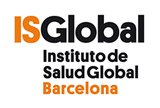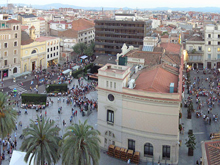Sabadell
In the city of Sabadell, all the women who attended the pregnancy care program and who had an ultrasound of their first trimester of pregnancy at CAP II Sant Felix (the only specialized primary care center in Sabadell the city) between July 2004 and In July 2006, they were invited to participate in the INMA study. A total of 657 women were included, who were followed in each trimester of pregnancy until the time of delivery at the Hospital de Sabadell (Corporació Sanitària Parc Taulí) which covers the entire population of Sabadell, acting as a specialized hospital of consultation and reference for. part.
An additional round of hiring pregnant women was held between May 2007 and July 2007, but directly when they went to give birth at Sabadell Hospital. A total of 120 women were included in this second phase.
Over the years, this group of children from the city of Sabadell have been evaluated approximately every 2 years, thanks to the predisposition of their families: that is, at 6 and 14 months, at 2, 4, 7, 9, 11 and 14 years. In July 2023 we have started the 18 years visit, and it is wonderful to acknowledge the valuable selfless collaboration of these young people, thanking them for their participation and commitment. Thank you for being part of this journey towards a brighter future.
-
Collaborating Entities
-
Processing of Data and Samples:
How do we treat your personal data and the biological samples we collect?
The data of the INMA-Sabadell birth cohort collected in the context of the INMA Project are kept at the Institut de Salut Global Barcelona (ISGlobal)
– Responsible for the Treatment: Private Foundation Instituto de Salud Global Barcelona (ISGlobal)
– CIF: G65341695
– Postal address: Carrer Rosselló, number 132, 2ª, 5ª and 7ª in Barcelona (08036)
– Telephone: (+34)932271806
– Data Protection Delegate, contact: lopd@isglobal.org
The data are treated with absolute confidentiality and in accordance with Regulation (EU) 2016/679 of the European Parliament and of the Council, of April 27, 2016, relating to the protection of individuals with regard to the processing of personal data and to the free circulation of this data and to Organic Law 3/2018, of December 5, on the protection of personal data and the guarantee of digital rights.
Health data is kept separate from personal data. Data dissociation means that your health information cannot be associated with you as your personal data is replaced by a numeric code. Dissociated information is archived for use by project researchers and their research partners. All the results of the study are presented in a database of the group of participants, data is never presented individually.
Personal data will be kept as long as the research project or successive projects within the same line of research is active, in this way your data may also be used by other projects / research within the area of the present project , or in global health research projects, both in infectious and non-communicable diseases, and environmental health, to study the effect of environmental factors on people’s health.
You are responsible for the veracity and correctness of the data you provide us and you have the right to exercise the rights of access, rectification, deletion, limitation of treatment, portability and opposition of your data in accordance with what has the regulations on data protection. To exercise them, you must write to the Data Protection Officer at lopd@isglobal.org and you must attach a photocopy of your national identification document or the equivalent. In addition to the possibility of exercising your rights, if you do not agree with the treatment carried out by the Entity or if you consider that your rights have been infringed, you can submit a claim at any time to the Spanish Data Protection Agency.
Biological samples are treated in accordance with current legislation (Law 14/2007 on biomedical research, and Royal Decree 1716/2011 regulating the use of biological samples for research). The samples are stored in the ISGlobal biobank, at Campus Mar (Barcelona Biomedical Research Park) and are included in collection C.0001626 included in the Registry of Collections of the Instituto de Salud Carlos III. These are only used in research projects directly related to the INMA Project and with the aim of studying biomarkers related to the effect of environmental factors on health.
The data obtained from the use of these samples will be treated in the same way as the rest of the data obtained in this study.
The provision of biological samples for this study is free and voluntary. This assumes that you will have no rights to potential commercial benefits from discoveries that may result from the biomedical research.
Finally, if you decide to withdraw your consent to participate in this study, no new data will be added to the database from the date you inform us that you decide to withdraw, and only the data obtained up to that time will be retained, to ensure the validity of the research. You can also request that the identifiable biological samples obtained so far be destroyed, so that no further analysis can be carried out.
- Número 16 - Boletín Sabadell - Diciembre 2019 (Catalán)
- Número 15 - Boletín Sabadell - Diciembre 2017 (Catalán)
- Número 14 - Boletín para niños Sabadell - Noviembre 2016 (Catalán)
- Número 13 - Boletín Sabadell - Febrero 2016 (Catalán)
- Número 12 - Boletín Sabadell - Junio 2015 (Catalán)
- Número 11 - Boletín Sabadell - Noviembre 2014 (Catalán)
- Número 10 - Boletín Sabadell - Marzo 2012 (Catalán)
- Número 9 - Boletín Sabadell - Enero 2011 (Catalán)
- Número 7 - Butlleti Sabadell - Juliol 2009
- Número 6 - Butlleti Sabadell - Desembre 2008
- Número 5 - Butlleti Sabadell - Juliol 2008
- Número 4 - Butlleti Sabadell - Desembre 2007
- Número 3 - Butlleti Sabadell - Gener 2007
- Número 2 - Butlleti Sabadell - Febrer 2006
- Número 1 - Butlleti Sabadell - Agost 2005









